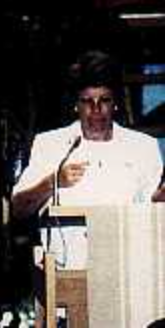Sermon by Anne-Lise Nerfin
International Meeting of Interchurch Families,
Geneva, 23-27 July 1998.
St Peter's Cathedral, Sunday 26 July 1998.

Biblical texts: Luke l l, 513 Colossians 1,1-6
What were you doing at midnight last night? Were you lying between sleep and wakefulness, reading or watching television, walking the dog or saying goodbye to your guests, reflecting in solitude or showering, or any of the multitude of other possibilities.
And we have no difficulty in imagining ourselves like this man ("one of you", said Jesus, one of us) being disturbed in the middle of the night by his friend. Midnight, because this is the hour when time stops until tomorrow.
We have no difficulty either in interpreting this parable in terms of the religious life, the life of our churches, and saying: look, we are an interchurch family, we are the militants for ecumenism, for human rights, for disabled people and for all good causes, we have knocked at the doors of our institutions, the authorities of our churches and they have replied that they do not want their sleep to be disturbed. How appalling!
Nor do we have any difficulty in comparing ourselves with the friend who turns up at an unseemly hour and who receives nothing to eat: I wanted to go to church, to the service, I wanted to open the Bible, to talk to a priest or a pastor, or the parishioners, and I found nothing, received nothing, I remained unfed.
We can also easily recognise ourselves in this man disturbed at midnight, and say to ourselves: of course, it was an emergency, but many things can wait until tomorrow; my family and I have the right to our rest. If you want to stay the course, you have to know how to organise yourself and respect the need for stillness and silence.
But it may be that these are not the only things this parable has to say to us.
So what does it say?
So, we must read, re-read the text itself, and two things immediately stand out:
l) Have you noticed that it concerns a friend, who is going to look for another friend, because another friend has arrived at his place? That it therefore concerns a network of friendship? A network strong enough that the person in the middle dares to turn up in the middle of the night, and dares to acknowledge that he has nothing to offer his guest. To dare to do this is true friendship. But you will also notice that the story continues: "if he will not provide for him out of friendship, the very shamelessness of the request will make him get up." Shamelessness. Friendship did nothing.
Likewise, the love which unites the partners in an interchurch family, or the friendship which ties families to each other, or the friendship which binds members of the same network or of a parish, may not be enough.
It is not out of love or friendship that we are able to demand to receive bread and to share it. It is not out of love or friendship that we are able to demand unity. Because unity, or the eucharistic hospitality, or the acknowledgement of the ministers and the theologians, are not rights born of our spirit of concord and of our happy affinities.
The man in the parable would not get up out of friendship, but because of the importunity, the shamelessness of his friend. Because it was midnight.
And this alerts our attention, for a second time.
2) Midnight. What happens at midnight in the Bible? It's always terrible things:
- the angel of the Lord passes among the houses of Egypt and strikes dead all their first born, while sparing the Hebrews.
- Samson pulls out the door posts of the city of Gaza.
- the young Eutychus, in the Acts of the Apostles, who fell asleep listening to Paul talk and died by falling out of a window.
- and in the parable of the wise and foolish virgins, it was the hour at which the bridegroom would arrive and the door which would close again.
Midnight is not an insignificant hour at which to be disturbed. Midnight is the hour of judgement. The hour at which one day draws to a close never to return. And another day begins. It is the critical hour after which time is no longer the same. The hour which changes the criteria of action. At midnight, friendship is longer in effect. Patience is no longer in effect. Sharing is decided according to other criteria. Unity itself changes.
It is no longer a matter of saying: "Oh, sorry, I mistook a fish for a snake; I mistook an egg for a scorpion, yet I'm not as bad all that..."
It is no longer a matter of saying: "for friendship, do this or that for us". At midnight, we must cast off our shame, our disgrace, our embarrassment, we just knock, demand, seek. And demand without shame the one thing we lack: the Holy Spirit.
The Holy Spirit. Not bread, but the bread of communion. Not unity. Because unity, and the eucharistic sharing, are, I am convinced, not the goals to attain, but the means. The aim, the life which God gives, his Holy Spirit which lights us, the full comprehension of the Gospel of Jesus Christ come to share suffering, divisions, __ and to put them to death for evermore. Unity, the sharing of bread, these are the means by which we live this in our daily lives.
In his vocabulary which is so special, so well-rounded, so religious, the apostle Paul says: I pray without ceasing for you. Without ceasing. At night, during the day, at midnight, at midday, and all the time. Because the Gospel continues, grows in you and in the world. Continual prayer, not because you are nice, or because you love one another. It is because the Gospel grows in you and in the world.
Prayer is also a means, not an end. A means to get to know our destitution and our needs, until the day and the hour of judgement. Most especially at that hour, when we shall without shame and without embarrassment say to God: "My friend, I need bread, I need unity, I need your Spirit, for myself, for my friends. I have nothing. I expect everything from you. I know that you will give me everything that I need."
We must go home. Whether nearby, or far away. The bread and the wine of the Holy Communion are offered to us. Perhaps we share in them. But, in whatever way, we know that having asked of the Holy Spirit, God has given to us, and brought us grace without ending.
Amen.
Anne-Lise Nerfin, Pastor.

